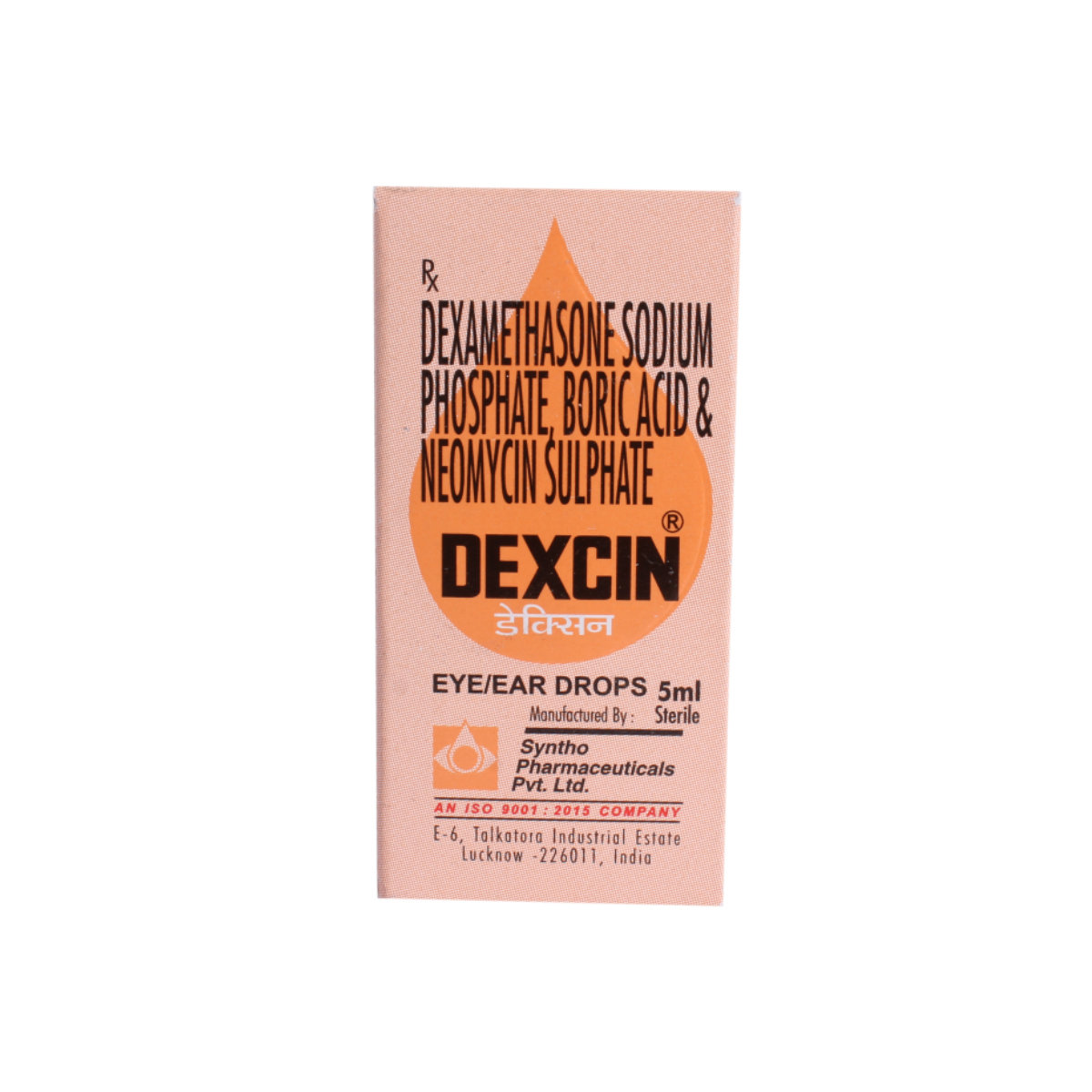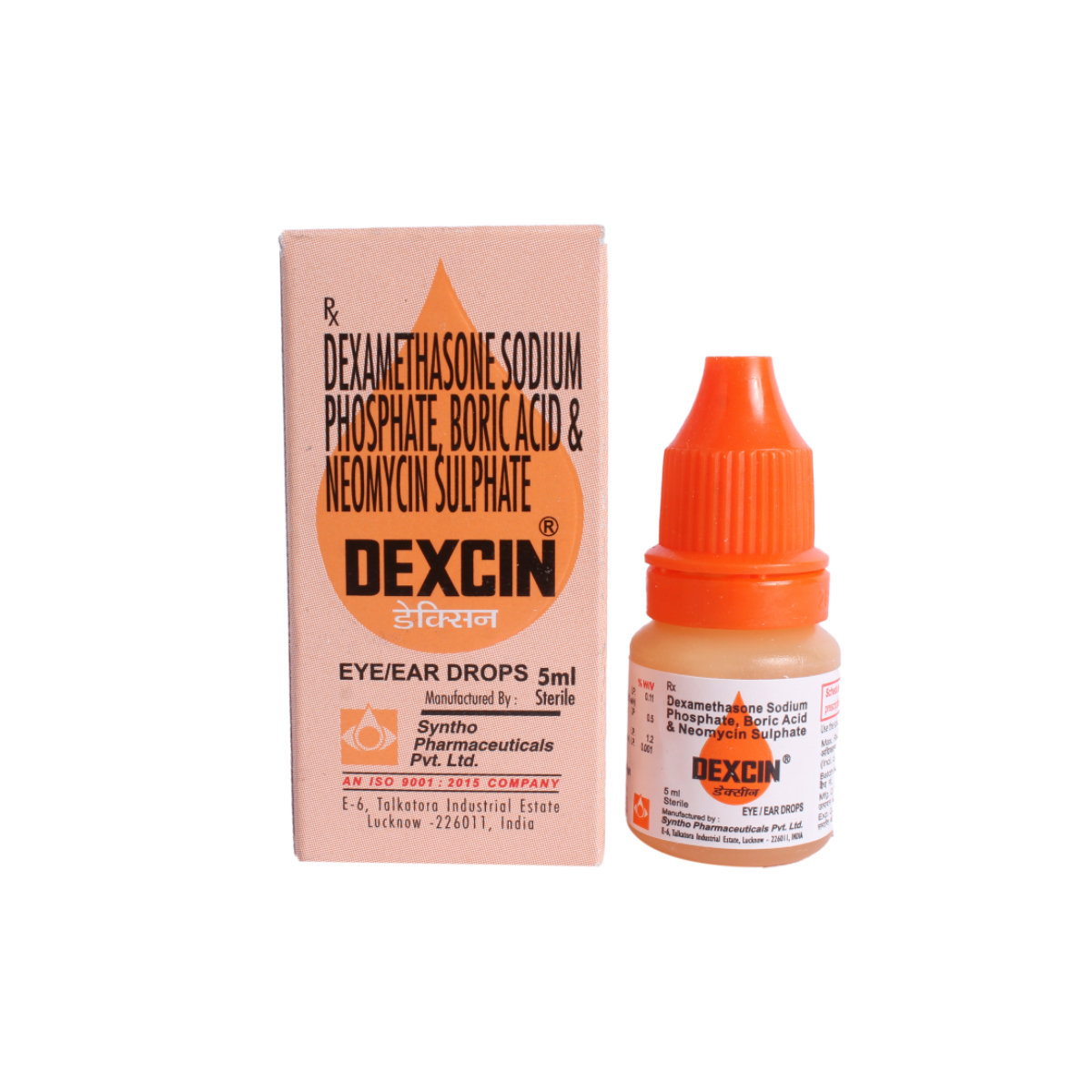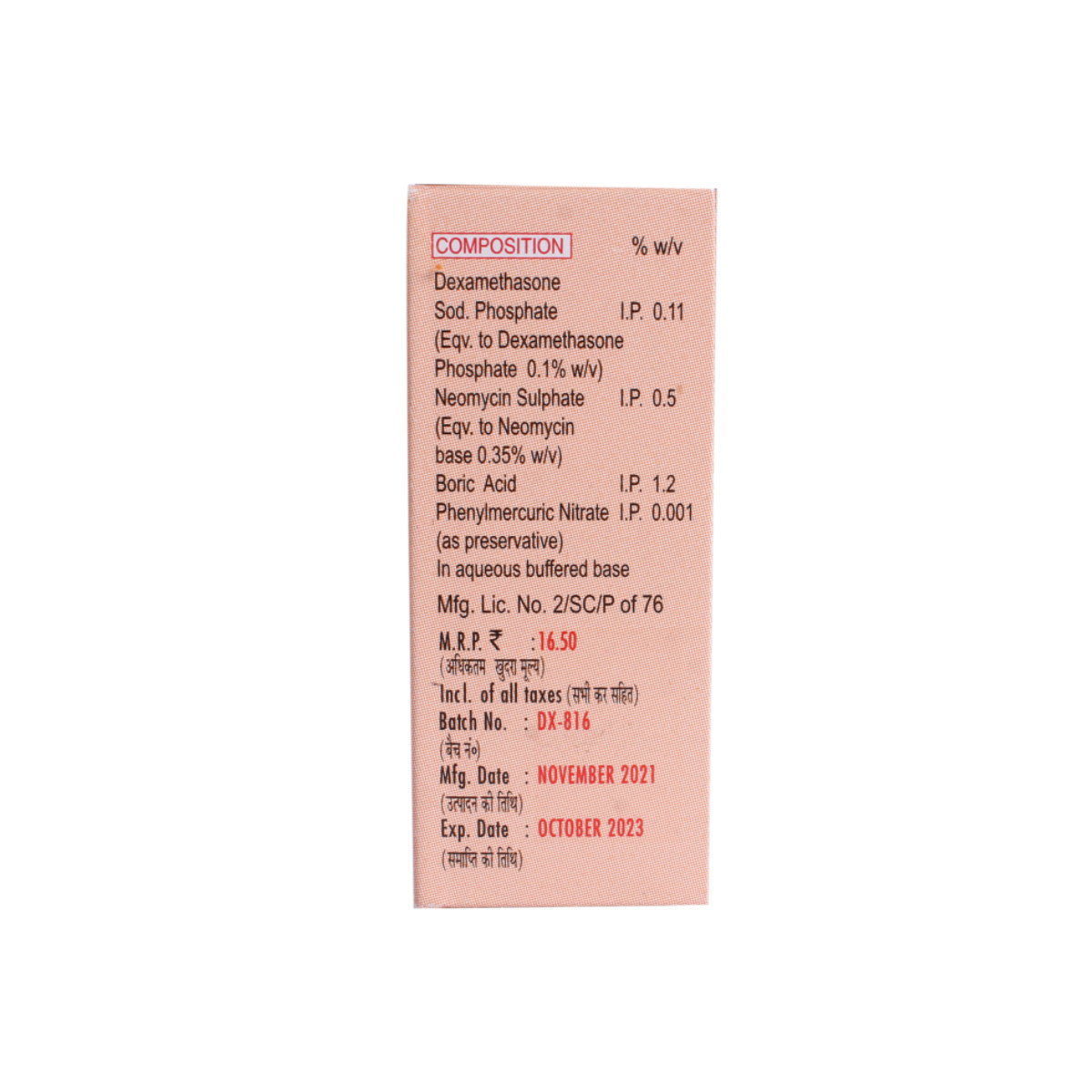Dexcin Eye/Ear Drops 5 ml
MRP ₹22
(Inclusive of all Taxes)
₹3.3 Cashback (15%)
Provide Delivery Location
Online payment accepted
 Prescription drug
Prescription drugWhats That
 11 people bought
11 people bought Manufacturer/Marketer :
Consume Type :
Expires on or after :
Return Policy :
About Dexcin Eye/Ear Drops 5 ml
Dexcin Eye/Ear Drops 5 ml is a combination medicine used to treat bacterial infections of the eye and ear. Conjunctivitis (pink eye) is a common bacterial eye infection associated with the conjunctiva's (white part of the eye) inflammation or infection and the inner eyelid. An ear infection occurs when the bacteria affect the middle or outer ear, leading to pain and inflammation. Dexcin Eye/Ear Drops 5 ml does not work against infections caused by fungi.
Dexcin Eye/Ear Drops 5 ml contains Dexamethasone, Neomycin, and Boric acid. Dexamethasone blocks the chemical messengers that cause swelling, itching, and redness. Neomycin kills the bacteria by preventing the synthesis of essential proteins required for survival of the bacteria. Boric acid acts against bacterial infections and provides soothing relief. Together, Dexcin Eye/Ear Drops 5 ml helps in treating bacterial infections.
You are advised to use Dexcin Eye/Ear Drops 5 ml for as long as your doctor has prescribed it for you, depending on your medical condition. Dexcin Eye/Ear Drops 5 ml may cause certain common side-effects such as pain, irritation, itching, and stinging sensation in some cases. Most of these side-effects do not require medical attention and will resolve gradually over time. However, you are advised to talk to your doctor if you experience these side-effects persistently.
Talk to your doctor if the irritation persists despite using Dexcin Eye/Ear Drops 5 ml for a week or if it worsens. Consult your doctor before using Dexcin Eye/Ear Drops 5 ml if you are pregnant or breastfeeding. Dexcin Eye/Ear Drops 5 ml should be used in children only if prescribed by the doctor. Please do not touch the tip of the dropper, as it may contaminate the contents. Keep your doctor informed regarding your health condition and the medicines you are taking to prevent any side-effects/interactions.
Uses of Dexcin Eye/Ear Drops 5 ml
Directions for Use
Key Benefits
Dexcin Eye/Ear Drops 5 ml is a combination of three drugs, namely: Dexamethasone, Neomycin, and Boric acid. Dexcin Eye/Ear Drops 5 ml is used to treat bacterial infections of the eye and ear. Dexamethasone blocks the chemical messengers that cause swelling, itching, and redness. Neomycin kills the bacteria by preventing the synthesis of essential proteins required for survival of the bacteria. Boric acid acts against bacterial infections and provides soothing relief. Together, Dexcin Eye/Ear Drops 5 ml helps in treating bacterial infections.
Storage
- Consult your doctor if you experience skin redness, itching, or irritation after taking medication.
- Apply cool compresses or calamine lotion to the affected skin area to reduce irritation.
- Stay hydrated by drinking plenty of water to help alleviate symptoms and keep your skin soothing.
- Monitor your skin condition closely and promptly report any changes, worsening symptoms, or concerns to your healthcare provider.
- Burning sensation is an abnormal side effect that needs medical attention. To relieve the burning feeling, your doctor may prescribe painkillers or antidepressants.
- Focused exercises can improve strength and reduce burning by soothing muscles.
- Change in lifestyle and improving nutrition can reduce the causes of burning sensation and provide relief.
- Your doctor may suggest nerve block injections as it is related to sensation in the skin.
- Burning feeling in a specific area would need mild electrical currents to reduce pain that targets the nerve affected. This practice must be done only if your doctor mentions it.
- Change positions or take a break from activity to relieve symptoms, as stinging can disturb your regular patterns.
- Avoid postures that put much pressure on the body area where stinging is felt.
- If you have a vitamin deficiency, take supplements or change your diet.
- Exercise regularly to improve inner strength.
- Follow your doctor's instructions to prevent stinging.
- Massage the affected area gently to get temporary relief.
Drug Warnings
Do not use Dexcin Eye/Ear Drops 5 ml if you are allergic to any of its components. Talk to your doctor if the irritation persists or worsens. Inform your doctor if you have glaucoma, high blood pressure, diabetes, eye infection or injury, hyperthyroidism, heart, kidney or liver problems. Consult your doctor before using Dexcin Eye/Ear Drops 5 ml if you are pregnant or breastfeeding. Dexcin Eye/Ear Drops 5 ml should be used in children only if prescribed by the doctor.
Drug-Drug Interactions
Drug-Drug Interactions
Login/Sign Up
Co-administration of Desmopressin with Dexcin Eye/Ear Drops 5 ml may increase the risk of hyponatremia (low levels of salt in the blood).
How to manage the interaction:
Co-administration of Dexcin Eye/Ear Drops 5 ml and Desmopressin can lead to an interaction, it can be taken if advised by a doctor. However, if you experience any symptoms like confusion, hallucination, seizure, changes in blood pressure, increased heart rate, fever, excessive sweating, shivering or shaking, blurred vision, muscle stiffness, tremors, stomach cramps, nausea, vomiting, and diarrhea, consult a doctor immediately. Do not stop using any medications without a doctor's advice.
When Dexcin Eye/Ear Drops 5 ml is taken with Ranolazine, may significantly reduce the blood levels of Ranolazine.
How to manage the interaction:
Co-administration of Ranolazine and Dexcin Eye/Ear Drops 5 ml can lead to an interaction, it can be taken if advised by a doctor. Do not stop using any medications without a doctor's advice.
When Regorafenib is taken with Dexcin Eye/Ear Drops 5 ml, may significantly reduce the blood levels of Regorafenib.
How to manage the interaction:
Co-administration of Regorafenib and Dexcin Eye/Ear Drops 5 ml can lead to an interaction, it can be taken if advised by a doctor. Do not stop using any medications without a doctor's advice.
When Rilpivirine is taken with Dexcin Eye/Ear Drops 5 ml, may significantly reduce the blood levels of Rilpivirine.
How to manage the interaction:
Co-administration of Rilpivirine and Dexcin Eye/Ear Drops 5 ml can lead to an interaction, it can be taken if advised by a doctor. Do not stop using any medications without a doctor's advice.
Co-administration of Norfloxacin with Dexcin Eye/Ear Drops 5 ml can increase the risk or severity of tendinitis (inflammation of the tendons attached to the muscle and bones).
How to manage the interaction:
Taking Norfloxacin with Dexcin Eye/Ear Drops 5 ml together can result in an interaction, it can be taken if a doctor has advised it. However, if you experience Stiff joints or difficulty moving your joints, joint pains, Swelling, or skin discoloration, contact a doctor immediately. Do not discontinue any medications without consulting a doctor.
Taking Dexcin Eye/Ear Drops 5 ml with Deflazacort may significantly reduce the blood levels of deflazacort, which may make the medication less effective in treating the condition.
How to manage the interaction:
Although using Dexcin Eye/Ear Drops 5 ml and Deflazacort together can possibly result in an interaction, they can be taken together if advised by your doctor. Do not stop taking any medications without consulting a doctor.
When Dexcin Eye/Ear Drops 5 ml is taken with Infliximab, it can increase the risk or severity of developing serious infections.
How to manage the interaction:
Taking Infliximab with Dexcin Eye/Ear Drops 5 ml together can result in an interaction, but it can be taken if a doctor has advised it. If you have any of these symptoms, it's important to contact a doctor right away. These symptoms include fever, chills, diarrhea, sore throat, muscle pain, difficulty breathing, weight loss, and pain or burning when you pee. Do not stop using any medications without a doctor's advice.
Taking Dexcin Eye/Ear Drops 5 ml may reduce the blood levels of Dasatinib, making the medication less effective in treating the condition.
How to manage the interaction:
Although there is a possible interaction, Dexcin Eye/Ear Drops 5 ml can be taken with Dasatinib if prescribed by the doctor. In case of any unusual side effects, consult a doctor. Do not discontinue the medication without consulting a doctor.
Co-administration of Dexcin Eye/Ear Drops 5 ml with Caspofungin may cause Caspofungin to be less effective.
How to manage the interaction:
Although there is a possible interaction between Caspofungin and Dexcin Eye/Ear Drops 5 ml, you can take these medicines together if prescribed by a doctor. Do not discontinue any medications without consulting a doctor.
Co-administration of Dexcin Eye/Ear Drops 5 ml together with Olaparib can reduce the blood levels of Olaparib.
How to manage the interaction:
Although taking Olaparib and Dexcin Eye/Ear Drops 5 ml together can evidently cause an interaction, it can be taken if a doctor has suggested it. Your doctor can recommend other options that won't cause any problems when taken together. Do not stop using any medications without talking to a doctor.
Drug-Food Interactions
Drug-Food Interactions
Login/Sign Up
Diet & Lifestyle Advise
Eye infections:
- Wash your hands regularly. Avoid touching the eyes with dirty hands.
- Avoid rubbing the eyes.
- Avoid sharing eye-makeup such as eyeliner, mascara, or kohl.
- Always use clean towels or tissues to wipe your eyes and face.
- Regularly wash and change the pillow-cases.
- If you wear contact lens. Clean and replace contact lens more often. Never share contact lens. Always remember to wash your hands before inserting and after removing the contact lens.
- Blink regularly as it helps in the spread of hydrating substances such as mucus and tears across the eyes.
Ear infections:
- Include fruits, vegetables, high-quality proteins, and whole wheat grains in your diet to strengthen the immune system.
- Avoid consuming foods that you are allergic to as it can cause the body to produce excess mucus leading to inflammation.
- Avoid getting things like shampoo, soap, and water into the ear as it can cause itching.
- Do not poke or scratch the ear, as it can cause damage to the ear canal, leading to inflammation. The inflamed skin can be infected by bacteria or fungi, which can cause infections in the ear.
- Wash your hands often.
- Stay healthy as immunity prevents infections.
Side Effects of Dexcin Eye/Ear Drops 5 ml
- Pain
- Irritation
- Itching
- Stinging sensation
Habit Forming
Therapeutic Class
All Substitutes & Brand Comparisons
Author Details
We provide you with authentic, trustworthy and relevant information
Drug-Diseases Interactions
Drug-Diseases Interactions
Login/Sign Up
FAQs
Disease/Condition Glossary
Eye infections: An eye infection occurs when bacteria affect the eye. The common bacterial eye infections are conjunctivitis, stye, and keratitis. Conjunctivitis (pink eye) is the infection of the conjunctiva (white part of the eye) and the inner eyelid. A stye is a bump on the eyelid or base of eyelashes. Keratitis is the inflammation of the cornea. It is a common problem in people who wear contact lenses. Eye infection symptoms include redness, pain, discomfort, itchiness, burning sensation, and discharge from the eye.
Ear infections: An ear infection occurs when the bacteria affect the middle or outer ear, leading to pain and inflammation. An ear infection occurs when the Eustachian tubes (small tubes that run from each ear to the back of the throat) become blocked or swollen. Ear infections can be painful due to inflammation and fluid build-up. An ear infection's symptoms include pain, discomfort inside the ear, pus or fluid-like drainage from the ear, pressure inside the ear, and loss of hearing.

Have a query?
Alcohol
Safe if prescribed
It is not known whether alcohol interacts with Dexcin Eye/Ear Drops 5 ml. Please consult your doctor.
Pregnancy
Consult your doctor
Please consult your doctor if you are pregnant; your doctor will prescribe only if the benefits outweigh the risks.
Breast Feeding
Consult your doctor
Please consult your doctor if you are breastfeeding; your doctor will decide whether Dexcin Eye/Ear Drops 5 ml can be used by breastfeeding mothers or not.
Driving
Safe if prescribed
Dexcin Eye/Ear Drops 5 ml may cause blurred vision if instilled in the eyes. So, avoid driving or operating machinery until your vision is clear.
Liver
Consult your doctor
Please consult your doctor if you have any concerns regarding the usage of Dexcin Eye/Ear Drops 5 ml in patients with liver impairment.
Kidney
Consult your doctor
Please consult your doctor if you have any concerns regarding the usage of Dexcin Eye/Ear Drops 5 ml in patients with kidney impairment.
Children
Safe if prescribed
Dexcin Eye/Ear Drops 5 ml should be used in children only if prescribed by the doctor.











_0.jpg?tr=q-85)

